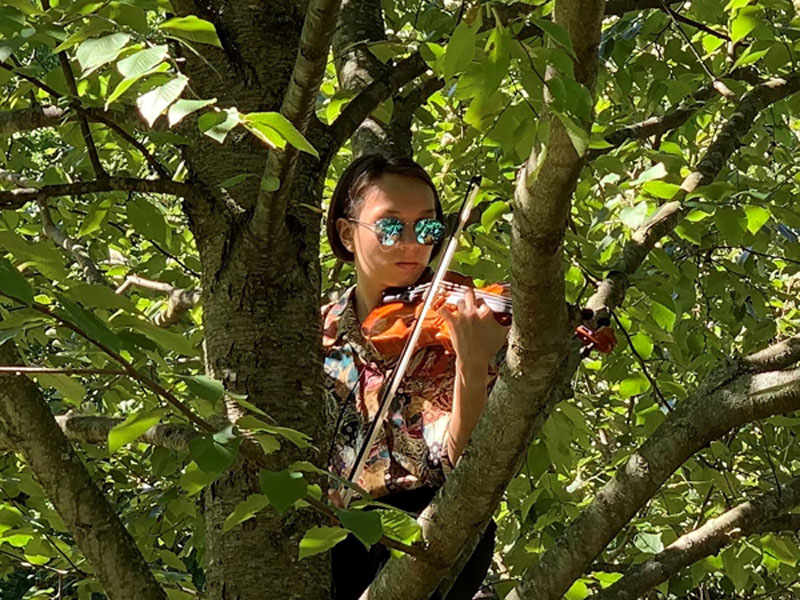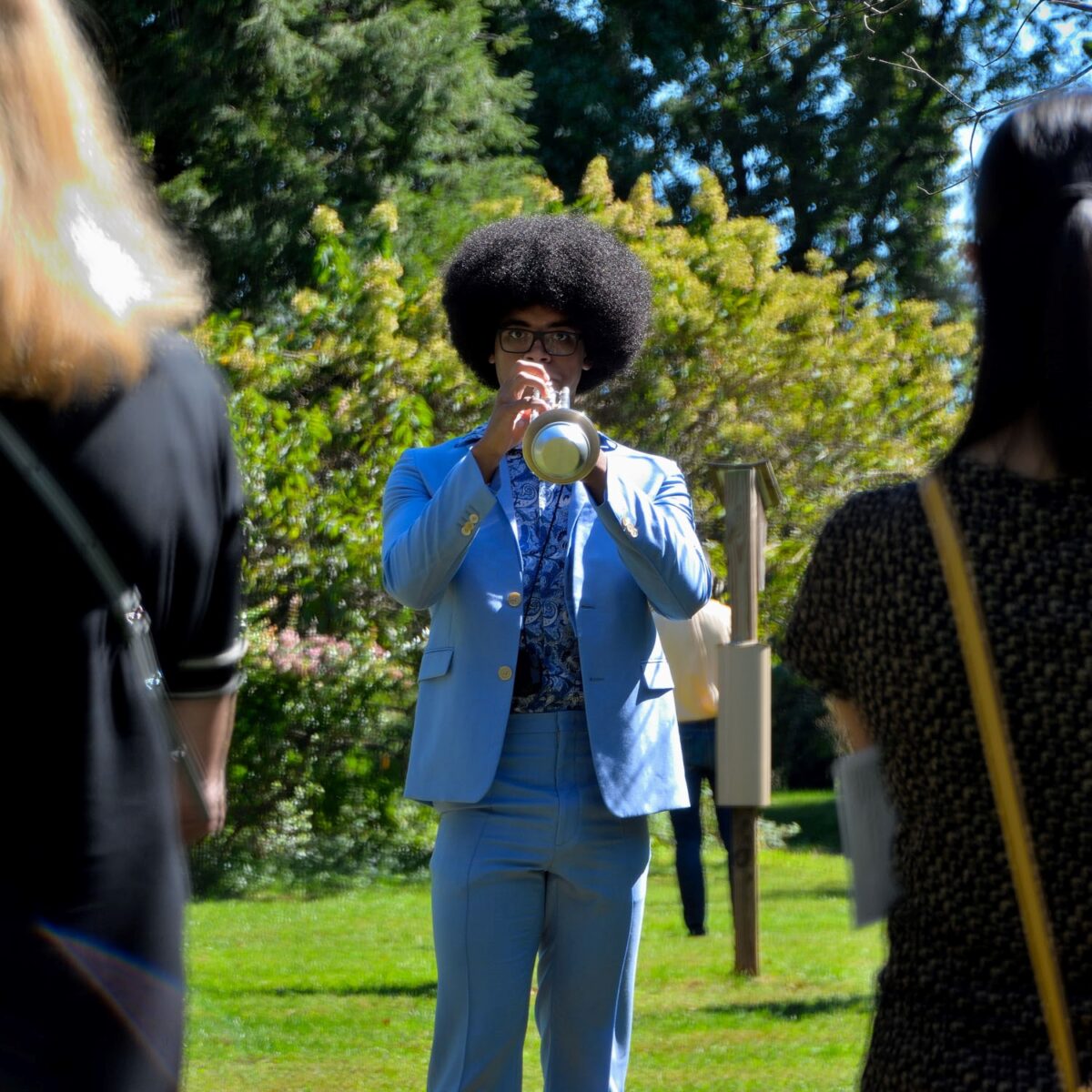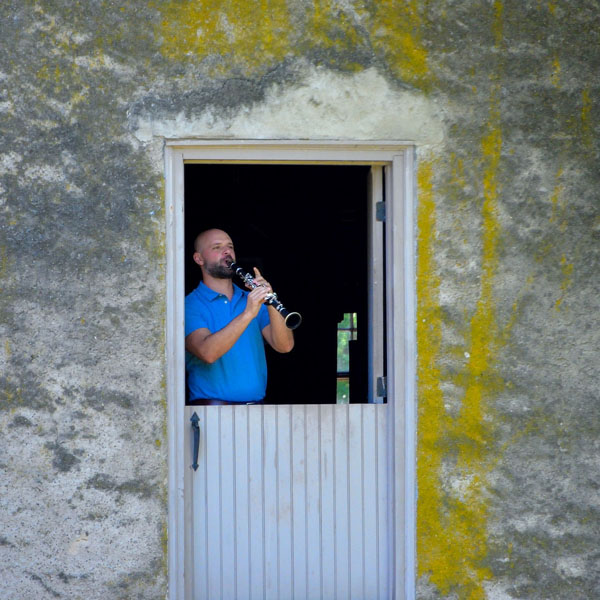There Are No Curtain Calls in Nature: Alarm Will Sound Play John Luther Adams's "Ten Thousand Birds."
by John Diliberto 9/27/2021
 I saw a violinist in a tree, a piano in a bush, and a trumpeter in a field. That was all part of composer John Luther Adams’s work “Ten Thousand Birds” performed by the avant-garde ensemble Alarm Will Sound, on Saturday, September 25 at the Morris Arboretum in Philadelphia. Adams’s work is always centered around the connection between music and nature and this composition was a definitive example of that.
I saw a violinist in a tree, a piano in a bush, and a trumpeter in a field. That was all part of composer John Luther Adams’s work “Ten Thousand Birds” performed by the avant-garde ensemble Alarm Will Sound, on Saturday, September 25 at the Morris Arboretum in Philadelphia. Adams’s work is always centered around the connection between music and nature and this composition was a definitive example of that.

If John Luther Adams hadn’t come up in the modern classical tradition, he might have been regarded as an ambient composer. His works often come across as sound fields, evolving slowly. The composer built his reputation as the music laureate of Alaska and the Arctic, drawing much of his inspiration from the dramatic and stark geography there. But now he’s moved to Mexico. One of his pieces. “the place where you go to listen,” evolves at the pace of the sun and the moon crossing the skies, unless there’s an earthquake. His 2014 work, “Become Ocean” won a Pulitzer and a Grammy award.
“Ten Thousand Birds” is based on native birdsongs from the northeast and midwest, as well as frogs, crickets, and what I interpreted as a swarm of mosquitos. The Morris Arboretum, at the outer edge of the city, was a perfect pastoral setting for the work. Instruments like piano, marimbas, percussion, glockenspiel and timpani were scattered around the field, most nestled under trees surrounding a small grass field. Audience members moved freely through the space, some taking up positions on the grass in the shade of trees, others exploring and following the many instrumental sounds that wafted through the air like, well, bird songs.
“Ten Thousand Birds” runs through a day in the life of avian creatures and after musicians silently entered the performing area, noteless breaths on trombone, clarinet and flute merged with barely scraped sounds from strings. As breaths become notes and trills, your attention is initially drawn from one instrument to another, seeking out its place in the environment like you would seek out a bird call. When a pennywhistle fluttered a a fragment of a melody, everyone turned their heads in that direction. But eventually, people gave in to the relative randomness of nature, and let the music pass through them.
 As the piece moved on, the musicians would sometimes gather like birds clustering together. Trumpet, oboe, trombone and French horn gathered around a timpani, then in a flash, like birds do, they scattered to different points of the field and continued moving, except, of course, the timpani. At another point, a quartet of violinists swarmed back and forth bowing high-pitched and nervous patterns, sounding like mosquitos to me. Sometimes there would be call and responses as violins answered each other from across the field. That’s when I spotted the violinist in a tree. The sound of frogs emanated from the outer edges at one point, played by horns, oboes and a bassoon..
As the piece moved on, the musicians would sometimes gather like birds clustering together. Trumpet, oboe, trombone and French horn gathered around a timpani, then in a flash, like birds do, they scattered to different points of the field and continued moving, except, of course, the timpani. At another point, a quartet of violinists swarmed back and forth bowing high-pitched and nervous patterns, sounding like mosquitos to me. Sometimes there would be call and responses as violins answered each other from across the field. That’s when I spotted the violinist in a tree. The sound of frogs emanated from the outer edges at one point, played by horns, oboes and a bassoon..
It was a perfect day for this performance, sunny with a deep blue sky and wispy cirrus clouds. The musicians were joined by the sounds of crickets and the gurgle of the Wissahickon creek. And of course, the sounds of man became part of the work, with fire engine sirens that distantly moved across half the circumference of the space and a jet that flew right over head. Humans were silent except for a few children and one intellectually disabled man who periodically let out long, low groans. I couldn’t see him and thought it might be a Tibetan singer until he rambled out into the performance area moaning before being corralled by one of his caretakers.
No one minded the moaning. He fit right in with this nature-born sound world. It was an immersive experience, the resonance of orchestral instruments creating an ambient sound field that merged with the environment. “Ten Thousand Birds” concluded the way it began, with noteless breaths. Then the ensemble moved silently off the field because there are no curtain calls in nature.
THE END
